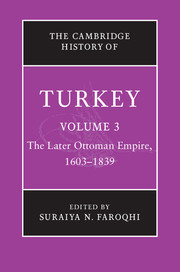Book contents
- Frontmatter
- PART I BACKGROUND
- PART II AN EMPIRE IN TRANSITION
- PART III THE CENTRE AND THE PROVINCES
- PART IV SOCIAL, RELIGIOUS AND POLITICAL GROUPS
- PART V MAKING A LIVING
- PART VI CULTURE AND THE ARTS
- 18 The Ottoman musical tradition
- 19 Arts and architecture
- 20 Ottoman literature
- Glossary
- Bibliography
- Index
- References
18 - The Ottoman musical tradition
from PART VI - CULTURE AND THE ARTS
Published online by Cambridge University Press: 28 March 2008
- Frontmatter
- PART I BACKGROUND
- PART II AN EMPIRE IN TRANSITION
- PART III THE CENTRE AND THE PROVINCES
- PART IV SOCIAL, RELIGIOUS AND POLITICAL GROUPS
- PART V MAKING A LIVING
- PART VI CULTURE AND THE ARTS
- 18 The Ottoman musical tradition
- 19 Arts and architecture
- 20 Ottoman literature
- Glossary
- Bibliography
- Index
- References
Summary
The earliest period to which we can trace back the inception of a specifically Ottoman/Turkish musical tradition is the second half of the sixteenth century. In and shortly after the 1550s we observe an extremely important threshold in the musical life of Ottoman cities. Unfortunately, due to the lack of sources – and particularly of any musical notation – we do not really know what the ‘antecedent’ musical traditions of royal courts and city-dwellers may have sounded like. It may well be, as has sometimes been advanced, that this existential caesura was precipitated by the musicians that Selim I (r. 1512–20) brought to the Ottoman capital from the lands he had recently conquered – in other words, from Tabriz, Syria and Egypt. Other musicians, though probably much fewer in number, were brought in by Süleyman the Magnificent from Baghdad after the Ottoman conquest of 1534. These musicians, whose practices were grafted onto the pre-existing musical traditions of Istanbul, probably contributed to the elaboration of a new and original imperial musical synthesis. A few of the compositions these musicians brought with them survived into later periods and were attributed to ‘the Persians’ (Acemler, Acemiyan) or ‘the Indians’ (Hinduyan).
Whatever the particulars of the case, the mid-sixteenth century did indeed witness the birth and establishment of an original musical tradition. This involved the establishment of new cultural centres, musicians/composers and makams (modes), in addition to the invention of original musical forms, styles and genres.
- Type
- Chapter
- Information
- The Cambridge History of Turkey , pp. 391 - 407Publisher: Cambridge University PressPrint publication year: 2006
References
- 2
- Cited by



